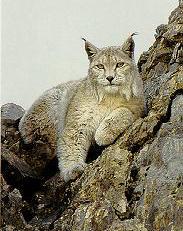

Common Names:
Genus: Felis
Species: lynx

The northern lynx is basically a very large cat with a powerful body, short sturdy legs, and a very short tail. They have large heads, and long tufted ears which stand straight up. Their coats are usually yellowish-brown and white on its undersides. The average weight of the northern lynx is 30 to 65 pounds. Their tails grow up to 7 inches.
The northern lynx can be found on the steppes of Asia. They also like to live in forests and rocky places of Canada, the northern United States and in fragmented areas of Europe.
The northern lynx always hunts for rodents, birds, fish, small deer, goats, or sheep. They usually live and hunt alone, and are nocturnal hunters. Sometimes northern lynx will hunt in pairs. Their mating season may be in January, but is normally in late February or in early March. They give birth to 2 or 3 kittens at a time. The females stay pregnant for 68 to 72 days, and give birth in a lair in a hollow tree, rock cleft, or a similar site. The kittens stay with their mother until the next mating season. Siblings usually continue to stay together after they leave their mother.
Northern lynx can climb well and are good swimmers which help them when hunting. They have very good vision, which helps them to stalk their prey over long distances. Northern lynx may jump 7 feet into the air to catch birds and they use their broad and long feet as snow shoes to keep them from sinking into the snow.
They help in their environment by keeping the rodent population down which is important because they multiply very quickly. They also eat large sick and almost dead animals.
There are not many northern lynx left in the world, partly because hunting the lynx is still permitted in the United States and Canada. People continue to hunt them for their fur and also for sport.
by Naomi R. 2000.
Bibliography:
"Lynx." Compton's Encyclopedia. 1992ed.
"Lynx.", http://www.cnet.windsor.ns.ca/Environment/Advocates/Animal/lynx.html, (1 June 2000).
"Lynx.", http://www.cattales.org/lynxfaq.html, (1 June 2000).
"Northern Lynx.", http://www.nhm.org/~pcnnon/cats/northern.html, (6 June 2000).